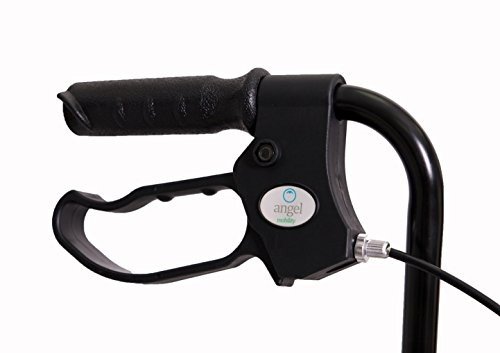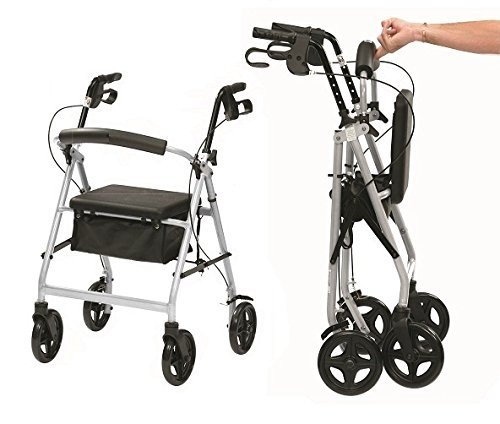Rollator walkers are fantastic companions for those seeking extra support while getting around. They offer stability and convenience, with features like seats and storage for added comfort during your outings. Whether you're walking in the park or navigating through your home, a rollator walker can make your life a lot easier.
Rollator Walkers
Explore our range of sturdy and reliable rollator walkers designed to enhance your mobility and independence
Product List
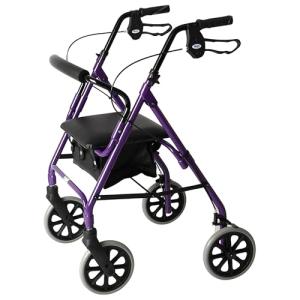
Purple Four-Wheel Rollator
Days Mobility
Product Review Score
4.57 out of 5 stars
53 reviews$136.41 $129.59
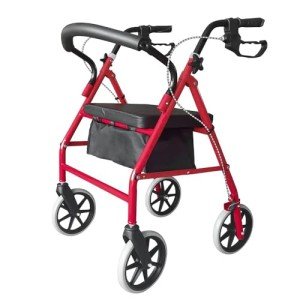
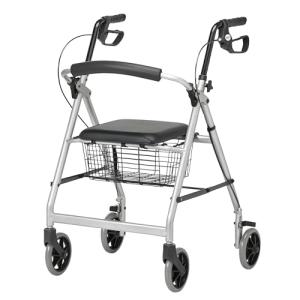
Folding 4-Wheel Walker Seat
Days Mobility
Product Review Score
4.9 out of 5 stars
93 reviews$119.99 $115.81
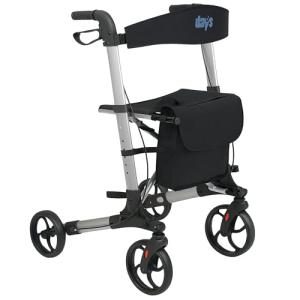
Days Lightweight Folding Rollator
Days Mobility
Product Review Score
4.44 out of 5 stars
216 reviews$93.73
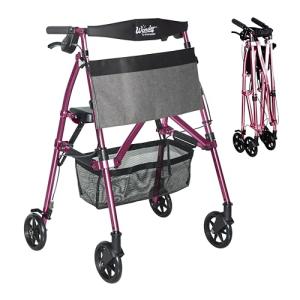
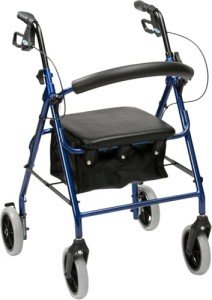
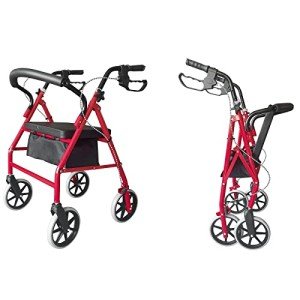
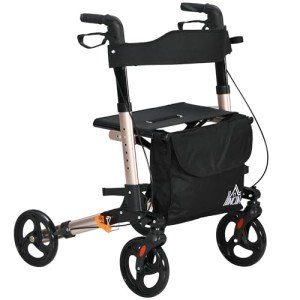
Folding 4-Wheel Walker with Seat
Homcom
Product Review Score
4.2 out of 5 stars
120 reviews$122.77 $109.13
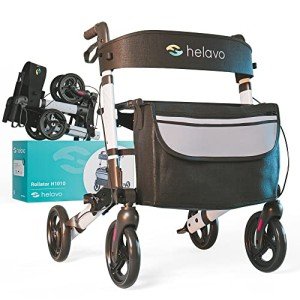
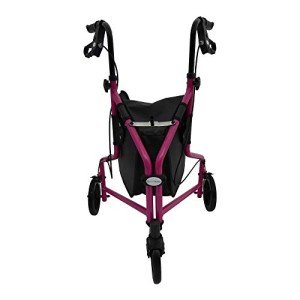
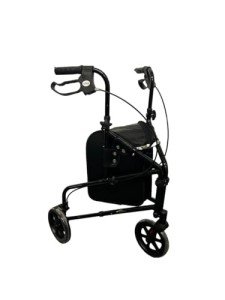
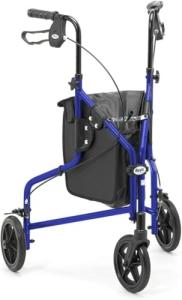
Days Lightweight Tri-Wheel Walker
Days Mobility
Product Review Score
4.7 out of 5 stars
83 reviews$109.13
As we age, maintaining mobility and independence becomes increasingly important. For many, walker's are indispensable in navigating daily life. Among the different types of mobility aids available, rollator walkers have gained tremendous popularity due to their unique design and functionality. This blog post aims to provide an in-depth understanding of rollator walkers, helping readers to choose the right one for their needs.
What is a Rollator Walker?
A rollator walker is a mobility aid that is wheeled and typically features a frame with three or four wheels, handlebars, and a seat. Unlike traditional walkers, which require users to lift the device while walking, rollator walkers are designed to be pushed along, making them easier to maneuver and control. They are equipped with brakes that allow users to stop and rest safely, adding convenience and safety.
Key Features of Rollator Walkers
| Feature | Description |
|---|---|
| Wheels | Typically offers three or four wheels for easy maneuvering. |
| Brakes | Allows for secure stopping and parking. |
| Seat | Provides a resting area when needed. |
| Storage | Many come with a basket or pouch to carry personal items. |
| Height Adjustment | Adjustable handles to suit different user heights. |
Types of Rollator Walkers
Rollator walkers come in various models tailored to different needs. Understanding the types can help users make informed decisions.
1. Standard Rollator
Description: These are the most common type, featuring a sturdy frame with four wheels, a seat, and hand brakes.
2. Lightweight Rollator
Description: Made from lighter materials, these are easier to transport and maneuver but may lack some features of standard variants.
3. Heavy-Duty Rollator
Description: Designed for users requiring additional support, these durable walkers can accommodate heavier weights and provide extra stability.
4. Rollator with a Seat and Storage
Description: These models come equipped with additional baskets or bags for carrying items, providing convenience for outings.
5. Pediatric Rollators
Description: Specialized for children, these walkers are smaller in size and designed for growing users.
| Rollator Type | Pros | Cons |
|---|---|---|
| Standard Rollator | Balanced stability, widely available | Bulky for transport |
| Lightweight Rollator | Easy to lift & transport | Less durable |
| Heavy-Duty Rollator | Increased stability and weight limit | Heavier to maneuver |
| Rollator with Storage | Convenience for outings | May weigh more due to materials |
| Pediatric Rollators | Tailored for youth | Limited availability |
Benefits of Using a Rollator Walker
-
Enhanced Mobility: Rollators offer support while allowing users to walk freely, alleviating fear and hesitation.
-
Safety Features: With built-in brakes, users can securely lock the walker in place while sitting or standing.
-
Comfort: The addition of a seat makes it easy to rest when fatigue sets in, providing comfort during long outings.
-
Storage Solutions: Having a basket or pouch allows users to transport personal items without straining their backs or arms.
-
Customizable: Many models come with adjustable heights, accommodating different user needs and preferences.
How to Choose the Right Rollator Walker
Choosing the right rollator walker can feel overwhelming given the myriad of options. Here’s a guide to consider:
-
Weight Capacity: Check the maximum weight the walker can support to ensure safety.
-
Wheel Size: Larger wheels can traverse uneven surfaces more easily, while smaller wheels may offer better control indoors.
-
Overall Weight: Consider how often you’ll need to transport the walker. A lightweight model can be beneficial for those who travel.
-
Adjustability: Look for models with adjustable handlebars for a comfortable grip that also reduces strain.
-
Footprint Size: Analyze the space where you plan to most often use the rollator, ensuring it fits comfortably through doorways and turns.
-
Add-Ons: Decide if you want additional features like a basket, cup holder, or cane holder based on your daily needs.
Where to Buy Rollator Walkers
Rollator walkers are available at various places, including:
- Medical Supply Stores: Offer a range of options and knowledgeable staff who can assist with finding the right model.
- Pharmacies: Often carry basic models for convenient purchases.
- Online Retailers: Websites such as Amazon, Walmart, and specialized medical supply websites offer extensive selections, often with customer reviews to help in decision-making.
- Local Community Centers: Sometimes, provide information on rentals or community programs assisting with the acquisition of mobility aids.
Frequently Asked Questions (FAQ)
1. How do I adjust the height of my rollator walker?
Most rollators come with a simple adjustment mechanism located at the hand grip. You can typically release a button or clip to change the height and make it comfortable for your needs.
2. Can I use my rollator walker outdoors?
Yes! Rollator walkers are designed for both indoor and outdoor use. However, consider the wheel size and tread for navigating rough terrains.
3. How do I maintain my rollator walker?
Regularly check the brakes, wheels, and frame for any signs of wear or damage. Clean the frame with soap and water, and periodically lubricate the wheels for a smooth ride.
4. Can I personalize my rollator walker?
Absolutely! Many users add accessories such as pouch bags or cup holders, and some choose customizable colors or styles for added flair.
5. Are rollator walkers covered by insurance?
Many insurance companies will cover one or more types of mobility aids, including rollator walkers. Check with your provider to understand the specifics of your policy.
Rollator walkers represent an invaluable resource for individuals looking to maintain their independence and mobility. With education about their types, features, and benefits, users can confidently select the right rollator walker for their unique needs. Whether exploring the local park or simply maintaining balance at home, the right mobility aid can transform one's quality of life. Ultimately, investing in a rollator walker could be one of the most beneficial decisions for enhancing mobility and ensuring safety.
